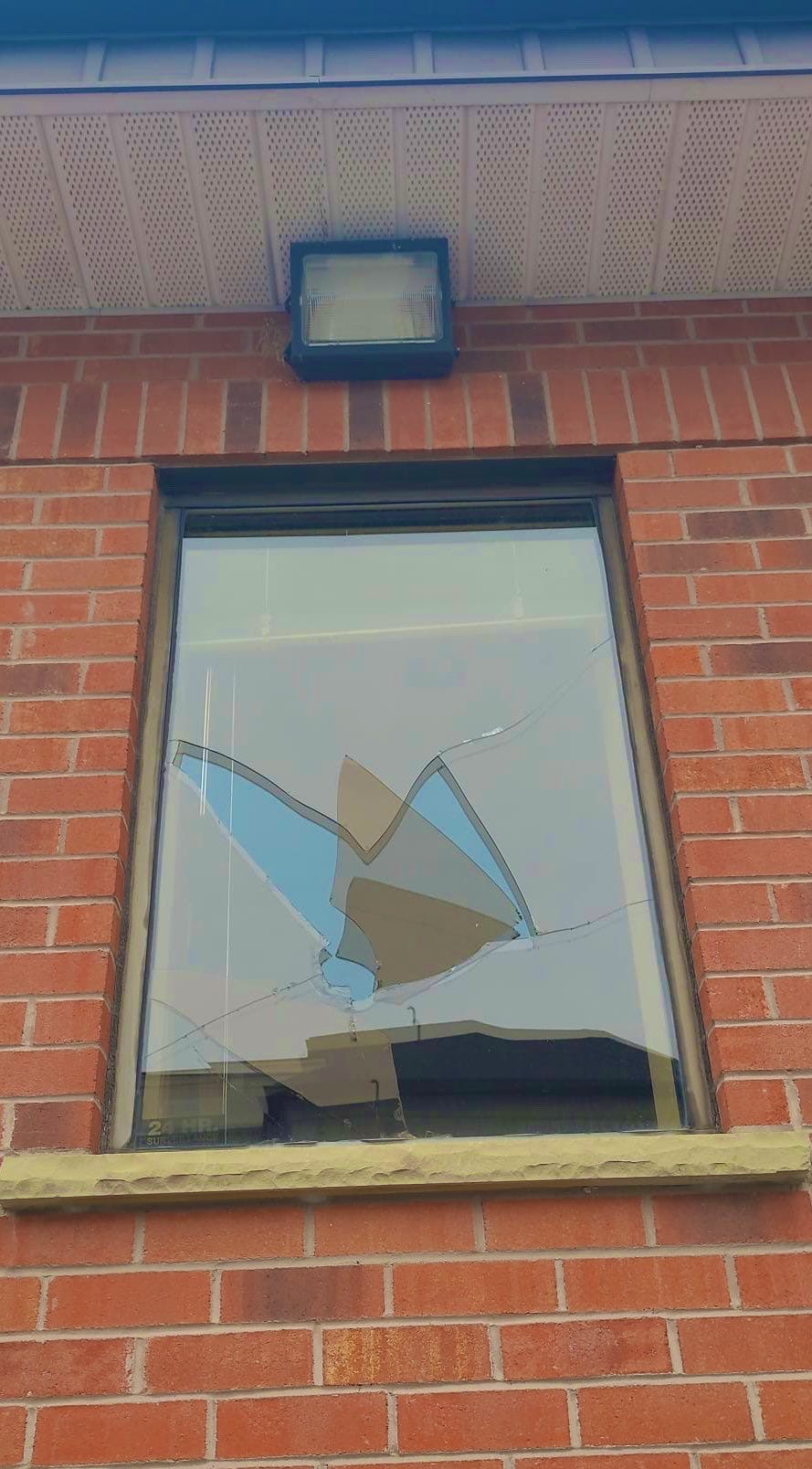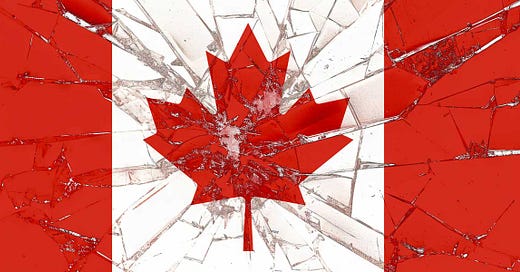We rarely run pieces this long. But today’s investigation—the story of how antisemitism became deeply embedded in Justin Trudeau’s Canada—called for it. This is a piece worth reading carefully. It is relevant not just to our many Canadian readers, but to anyone invested in the future of the West. —Bari Weiss
‘The Denial Is What’s Painful’
For Sarah Rugheimer, a professor of astronomy at York University in Toronto, the first sign of the virulent strain of antisemitism now embedded in Justin Trudeau’s Canada appeared on a lamppost.
It was a few weeks after the Hamas massacre of last October 7. Rugheimer, 41, was walking in a park near her home in the city’s quiet Cedarvale neighborhood when she saw a poster of the Israeli hostage Elad Katzir, a 47-year-old farmer from Kibbutz Nir Oz, covered with swastikas.
In the days that followed, as the war raged in Gaza, swastikas turned up all over Cedarvale. They also started appearing on the York campus, where Rugheimer serves as the Allan I. Carswell Chair for the Public Understanding of Astronomy. As fall turned to winter, a swastika showed up in the snow outside the campus building where she works.
An astrophysicist with a particular interest in the origins of life on Earth and the possibility of life on other planets, Rugheimer tended to confine her worldly concerns to scientific matters. So the swastikas came as a shock. But worse was to come.
She grew up in Montana, and her academic career took her around the world—from a PhD in astronomy and astrophysics at Harvard University to Scotland, England, and now Canada. But until taking up her post at York University two years ago, Rugheimer said she’d never encountered any overt antisemitism. Nor had she given much thought to her identity as a Zionist: Like the vast majority of Jews around the world, Rugheimer believes in Israel’s right to exist.

Jew-hatred was a phenomenon of the fringes, she reckoned. “It wasn’t on my radar,” she told me. Now, it’s everywhere. “Every week there is a major incident in Canada, and multiple minor ones every day in my neighborhood.”
It was what was happening inside her university that disturbed her the most.
York’s student unions issued a declaration just after the attack calling the barbarism of October 7 a “justified and necessary” act of resistance against settler colonialism, genocide, and apartheid. The student groups found widespread support among York’s professors—some of whom Rugheimer considered friends.
A politics department faculty committee demanded the university enforce a definition of “anti-Palestinian racism” that encompassed any expression of sympathy for the right of Israelis to exist within their own state: “Zionism is a settler colonial project and ethno-religious ideology in service of a system of Western imperialism that upholds global white supremacy.”
She was shocked by the declarations, and the defaced posters, and the swastikas. But for Rugheimer there was something worse. “The denial is what’s painful,” Rugheimer said. The denial of the rapes and savagery of October 7, 2023. The denial of the pervasive antisemitism in “anti-Zionist” polemics. The denial of Jewish history itself. “Reasonable people can disagree about what to do in an intractable conflict, but the denying of what should be uncontroversial facts makes it impossible to have hope.”
This sort of despair has become a feature of everyday life for Jews across Canada who are experiencing open hatred—and yet are living under a government that appears either blind to it, paralyzed by it, or indifferent to it. Law enforcement in Canada is not blind. Quite the opposite. Officers want to do their jobs. What they say is that they lack the moral support from the political class to enforce the law. And that they cannot keep up with the volume of hate crimes—crimes that arise from a widespread ideology that has normalized the idea that “Zionists” anywhere are a fair target for attack.

Perhaps nothing captured Canada’s dark new reality better than a split-screen story from late last month.
On November 22 in Montreal, at the 70th annual session of the NATO parliamentary assembly, rioters organized by the organizations Divest for Palestine and the Convergence of Anti-Capitalist Struggles wreaked havoc on the city. They ignited smoke bombs, threw metal barriers into the street, and smashed windows of businesses and the convention center where the NATO delegates were meeting. The rioters torched cars. They also burned an effigy of Israeli prime minister Benjamin Netanyahu.
While Montreal burned, Trudeau was dancing and handing out friendship bracelets at a Taylor Swift concert in Toronto. It took 24 hours for him to weigh in with a single tweet.
‘It Was Like a Dam Burst’
The impression that the violence unfolding around them is somehow invisible to the state responsible for their protection has overwhelmed not only relative newcomers to Canada like Rugheimer, but also Jews who have lived in Canada for decades. People like Robert Krell, 84, the former director of postgraduate education in the Department of Psychiatry at the University of British Columbia.
A pioneer of Holocaust education in Canada and a specialist in survivor trauma, Krell immigrated to Canada at the age of 11, after having been hidden by a Catholic family during the Nazi occupation of Holland. Krell was not as shocked by the unspeakable barbarism of the Hamas massacre of October 7 last year as by the jubilation the atrocities elicited from within the “progressive” milieu across Canada—and by the total silence from the “social justice” scene.

On Sunday, October 8, activists affiliated with the terrorist-designated Popular Front for the Liberation of Palestine were already shouting their happiness into megaphones to a crowd at the steps of the Vancouver Art Gallery, only a few minutes’ drive from Krell’s home. “We are calling on those in so-called Vancouver to uplift and honor the resistance,” they said. “Show solidarity and celebrate the steps towards liberation!”
Scenes like these repeated themselves in cities across Canada—all the way to St. John’s, Newfoundland.
“On October 7 I was horrified,” Krell told me. “I was shocked to the core by the cruelty, the rapes, the mutilations, the killing of children, the gouging of eyes . . . but I could believe it.”
What he found impossible to fathom was what he saw on October 8, and in all the days that followed.
“It was like a dam burst. I can’t describe the emotional blow. I guess I thought there would be a cry of outrage about what happened, you know, from the human rights people, Black Lives Matter people, the MeToo people. I shouldn’t have been surprised, but I just couldn’t grasp the concept, that when people heard and saw what had been done to those Jews, there was nothing except celebrations of Hamas as liberators.”
Americans are familiar with the pattern that has been repeated at dozens of Canadian university and college campuses—the “pro-Palestinian” occupations, encampments, manifestos, disturbances, and explicit celebrations of the October 7 “resistance.” In Canada, however, the sociopathology that shocked Rugheimer and Krell is by no means confined to the extremes of campus politics or the rantings of far-left activist groups.
Rather than discovering how torn the fabric of their society has become, Canadian Jews are being forced to come to terms with just how deeply antisemitism has been woven into it.
This is not a matter of anecdote or impression.

Last month, a report by Israel’s Ministry for Diaspora Affairs and Combating Antisemitism found a 670 percent increase in antisemitic incidents in Canada since October 7, 2023, including “violent attacks such as shootings targeting Jewish institutions and arson attacks targeting schools, synagogues, and other community institutions.” There are about 40 million Canadians and roughly 350,000 of them are Jewish—representing less than 1 percent of the country’s population.
“Most Canadian Jews feel unsafe and victimized,” the University of Toronto sociologist Robert Brym concluded in an in-depth attitudinal survey of Canadians, undertaken in collaboration with EKOS Research, published earlier this year. “They perceive a rise in negative attitudes toward Jews in recent months and years. Most doubt the situation will improve.”



